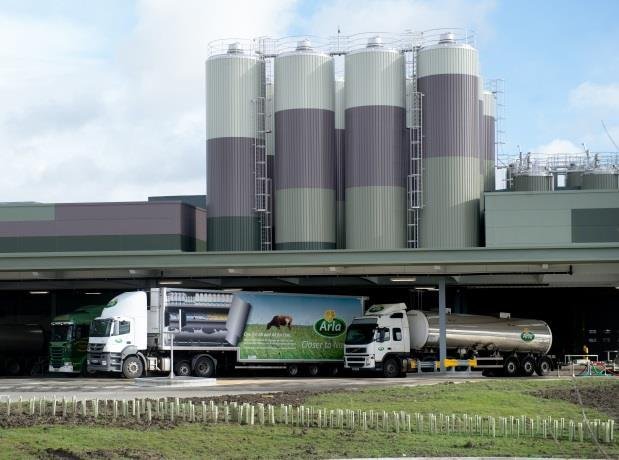Case Study
Arla
Arla Foods is a global dairy company owned by more than 11,200 dairy farmers in seven European countries. The organisation provides a wide range of dairy products and helps its customers live healthier lives.
Arla is passionate about its sense of responsibility and believes that sustainability and profitability go hand in hand. Its ambitious growth strategy in the UK has seen the development of its flagship dairy production site in Aylesbury. This site has been earmarked to become the first zero carbon milk processing facility in the world! Waste reduction, recycling and re-use are integral parts of this objective and as such, Arla were extremely selective in their choice of waste partner.
Zero Landfill
With a goal of zero waste to landfill by 2020, the business is committed to uplifting its recycling and incineration rates across all its facilities. At Arla Aylesbury, this led to the appointment in 2019 of Cawleys as their waste management partner.
Cawleys were chosen for their sustainable and innovative approach to waste recovery. The ground breaking ‘Infinity scheme’ has helped the facilities team at Arla embed a culture of waste segregation and an acute awareness of the benefits or recycling across the business.
At roll-out Cawleys provided clear signage and colour coding around the facility. This has enabled Arla employees to quickly and easily segregate waste at source.
Introducing Infinity
Separate bins are in place for food, paper & card, plastic bottles & drinks cans, single-use coffee cups and general waste. They are creating bales of cardboard and a variety of plastic types meaning they are getting maximum potential volumes sent back into the manufacturing process avoiding the need for raw materials. Employees are asked to identify their waste, refer to the signage and deposit the correct items in the correct bins.
The aim of the infinity scheme is to continually improve recycling rates. The logic behind the scheme is that waste segregated at source will be of better recycling quality than that which is combined with other waste streams. Cleaner and dryer waste that is pre-separated is proven to result in drastically improved recycling rates and lower incineration levels. Separation in this way has also reduced the volume of general waste, saving Arla money on its waste management costs.
The environmental benefits of recycling outweigh those of energy from waste. The more waste that’s recycled, the lower the reliance on raw materials and the lower the carbon emissions.
Recycling Targets
Arla have an enviable 90% recycling target, the target at the Aylesbury site is 95%. To achieve this Cawleys have provided and in-depth education program, including several ‘Small Action Big Impact’ awareness days. These sessions allowed the team at Cawleys to engage directly with Arla employees to make them aware of the importance of placing the correct waste items in the corresponding bins, and the consequences of not doing so. Employees were also asked for feedback on the scheme and ideas in relation to its potential for improvement.
Clever Compactors
As part of the contract Cawleys also installed two new compactors for general waste. The compactors compress general waste, reducing the volume and cutting the frequency of collections. As a direct result of this, road miles have been reduced along with Arla’s carbon footprint. In addition, Cawleys general waste is also processed through a ‘dirty’ materials recycling facility. This sorts through every bag of general waste to recover and recycle as much of it as possible – further boosting Arla’s green credentials. Any items that are not suitable for recycling are packaged up into bales and used as refuse derived fuel.
Cawley’s sustainable approach to waste is not only welcomed by Arla’s regular waste requirements, it is also employed to deal with more unusual and hazardous waste streams generated on site by the energy centre and general lab testing areas.
Ultimately Cawleys and Arla are perfect business partners with complimentary ethics that allow both organisations to work towards sustainable business

